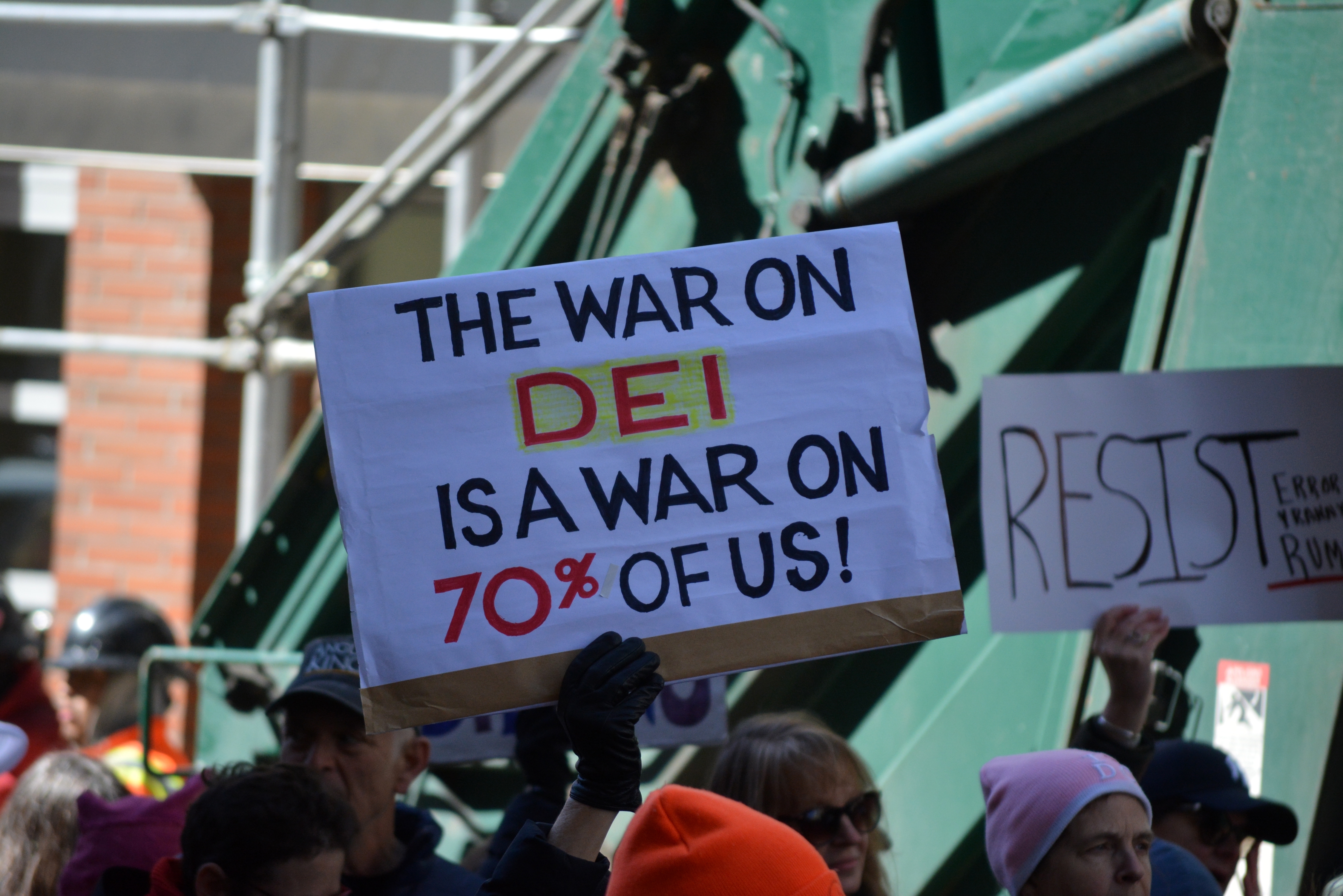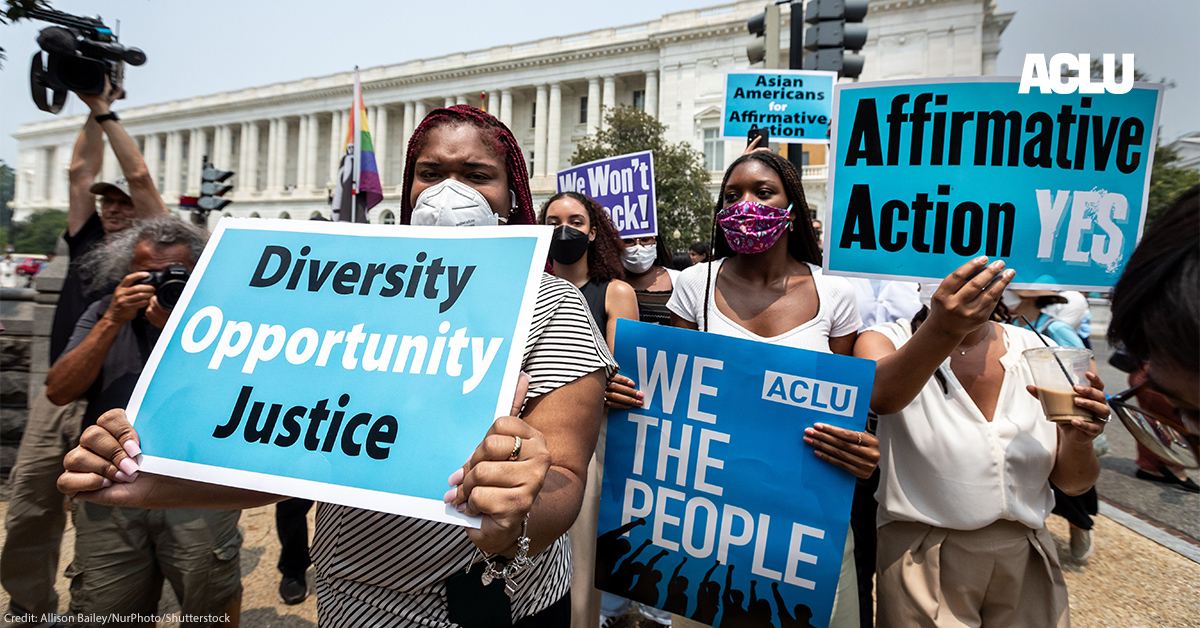Across the country, right-wing groups are working to dismantle long-standing anti-discrimination protections and statutory mandates by targeting what they broadly refer to as diversity, equity, inclusion, and accessibility (DEIA). These attacks on DEIA are not new. Rather, they’re part of a broader strategy to discredit DEIA and weaponize the term itself, expanding its definition to encompass any ideas right-wing politicians disagree with under the guise of opposing “identity politics.”
Since the Supreme Court's blow to affirmative action in higher education admissions in 2023, state lawmakers have introduced more than 106 anti-DEIA bills. Now, President Donald Trump’s administration is working to eradicate DEIA initiatives and civil rights protections with executive orders that would reverse decades of federal anti-discrimination policies.
We know that these policies and initiatives are essential to upholding civil rights, addressing discrimination, and ensuring all communities have a chance at the American dream. Though Trump and other right-wing leaders have threatened to turn back the clock on many years of progress, nothing in federal law has changed. Decades of legal precedent remain and institutions continue to have an obligation to uphold them.
What is Diversity, Equity, Inclusion, and Accessibility?
DEIA is not an abstract concept; it is a framework for building institutions where everyone belongs and is able to thrive, while addressing systemic barriers that have historically excluded marginalized communities.
- Diversity ensures representation among qualified persons across race, national origin, sex, gender, sexual orientation, disability, age, socioeconomic status, military status, shared ancestry, parental status, persons who live in rural communities, and more so that institutions reflect the communities they serve.
- Equity recognizes that inequalities exist and works to dismantle the barriers that disproportionately harm marginalized communities, ensuring fairness in access to resources and opportunities.
- Inclusion ensures that institutions are not just diverse, but that all individuals, especially those historically excluded, can fully participate and contribute without fear of discrimination or bias.
- Accessibility expands opportunities for individuals of all abilities by removing physical, technological, and systemic barriers that may prevent full participation in society through reasonable accommodations, inclusive work and public spaces, and more.
By embedding these principles into admission practices in educational institutions and recruitment, promotion, and retention efforts within workplaces and the military, we create a diverse, equitable, inclusive, and accessible America that betters education outcomes, increases business performance, and creates equitable opportunity for all, not special privileges for some.
Where Did DEIA Originate?
DEIA initiatives were a direct response to widespread, institutionalized discrimination in America. Landmark policies, like the Civil Rights Act of 1964, laid the groundwork to outlaw discrimination based on race, color, religion, sex, or national origin. Over time, additional federal anti-discrimination laws such as Title IX and the Americans with Disabilities Act expanded civil rights protections to include gender equity, disability rights, and protections for LGBTQ+ individuals. Building on these legal foundations, public and private sector entities expanded initiatives, programs, and workplace policies to increase access to education, employment, and public contracting opportunities.
How is DEIA Under Attack?
The recent attacks on civil rights protections are part of a larger backlash that has intensified starting in 2020, when the killings of George Floyd, Ahmaud Arbery, and Breonna Taylor sparked unprecedented nationwide protests that ignited a renewed push for racial justice. In response, workplaces, schools, and other institutions worked to expand DEIA efforts in their communities, inciting aggressive pushback from far-right leaders. This backlash has escalated and the Trump administration is now taking action to dismantle DEIA policies and anti-discrimination protections in public and private institutions.
In addition, the Trump administration has called to dismantle, impose significant budget cuts and employee reductions on, federal agencies that play a crucial role in ensuring fair hiring practices, enforcing civil rights laws and regulations, and addressing racial and economic disparities. Agencies including the Department of Education, the Equal Employment Opportunity Commission, the Department of Justice, and the Department of Housing and Urban Development. These agencies not only enforce civil rights laws and regulations to prevent and combat discrimination, they also ensure that government programs remain accessible to all individuals, including people of color, women, LGBTQ+ individuals, people with disabilities, and those with limited English proficiency.
The push to dismantle DEIA and reduce or eliminate the enforcement authority of federal agencies represents a coordinated and deliberate attack on long-standing civil rights advancements. These efforts, including Trump’s executive order to roll back policies that have empowered the Department of Labor to affirmatively ensure equal opportunity in federal contracting since 1965, threaten to undo decades of federal anti-discrimination policies.
How Does DEIA Impact Our Lives?
Education: DEIA is integral to ensuring that all students receive a quality education. Research has shown that inclusive K-12 and college curricula and environments are highly predictive of student retention and academic success – not just for students of color, but for all students. When young people feel they belong and have access to diverse spaces, they can fully engage academically, increase understanding and respect across differences, and succeed in society.
The principles of DEIA are deeply embedded in the provision of education, including in effective pedagogy and state and local laws and standards. DEIA efforts in education include policies that ensure educational environments are free from harassment or discrimination, as well as permit students to embrace their identities and learn about their history.
Military: DEIA policies in the military help ensure that qualified individuals are not excluded based on race, sex, gender, sexual orientation, religion, or disability – factors unrelated to their ability to serve. Military leaders themselves have pushed back, defending DEIA efforts by emphasizing that a diverse and inclusive military is a stronger and more effective force.
Throughout military history, however, discriminatory policies kept entire groups of people from serving in the armed forces. Black service members were subject to segregation through World War II and LGBTQ+ service members were forced to hide their identities under policies like Don’t Ask, Don’t Tell until its repeal in 2011. Transgender individuals were similarly restricted from service until the Pentagon lifted that ban in 2016, only to see their efforts rolled back under the Trump administration and then reinstated again in 2021. Women, too, faced systemic exclusion, barred from combat roles until 2015, when the military finally opened up previously off-limits positions.
Workplace: Building diverse, equitable, and inclusive workplaces is essential for strengthening businesses, fostering innovation, and driving economic growth in both public and private sectors. DEIA efforts in employment include: Programs that aim to prevent workplace discrimination and harassment, pursuant to federal, state, and local laws and regulations; actions to achieve pay equity and transparency; parental leave and lactation rooms for nursing/pumping; time off for religious observances; mental health and disability resources and more.
When employers commit to DEIA, they: Reduce legal and financial risk by minimizing employment discrimination claims and the monetary settlements and judgments that can follow; .Foster inclusive, comfortable, and supportive work environments that lead to a productive workforce; and Drive innovation and profit by leveraging the diverse ideas, perspectives, and experiences of employees who are representative of every aspect of both American and global societies.
What Happens Next to DEIA Efforts?
The ACLU will speak out against efforts from the federal government to attack DEIA and erase decades of progress toward a more equitable society. Everyone benefits when we all have access to the core pillars of our democratic society that ensure equitable access to opportunity.
The ACLU, our affiliates, and our partners in the movement will continue to challenge threats to critical federal anti-discrimination protections and unlawful attempts to bully institutions into abandoning these essential practices for ensuring everyone has a chance to succeed. Now more than ever, institutions must stand firm in their commitment to diversity, equity, inclusion, and accessibility.

